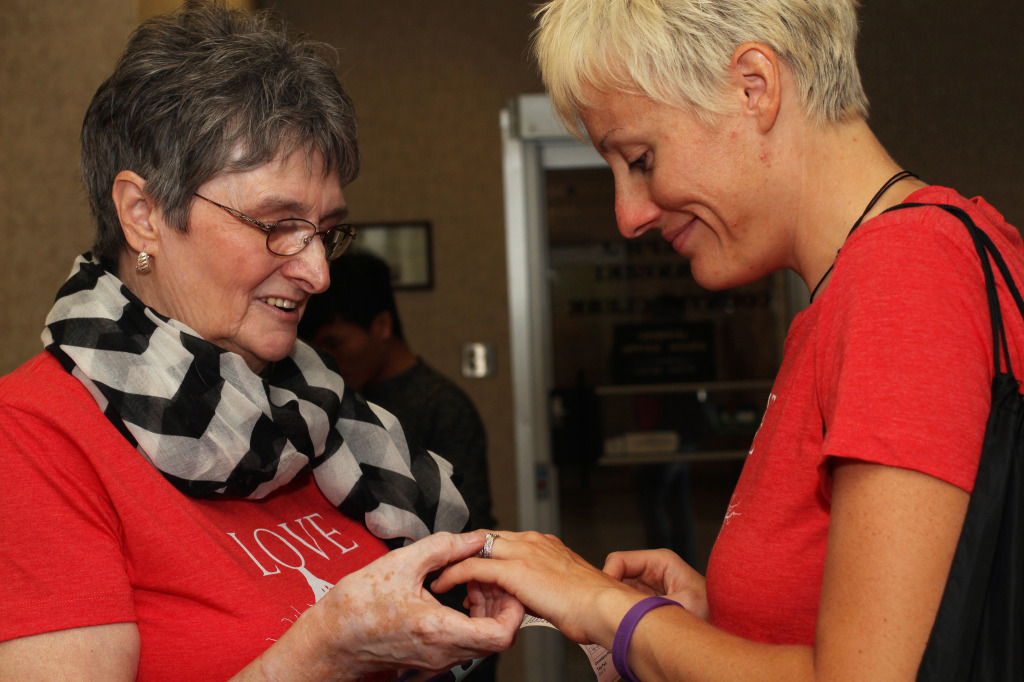
The SCOTUS decision to not hear marriage equality cases provides an example of how not deciding creates a decision unto itself. Image: A couple marry in Wisconsin in June 2014. Flickr/tapps
The Roberts Court’s tenth term began not with a whimper but a bang yesterday morning.
In an unexpected move, the justices declined to hear all seven marriage equality cases before them. This decision not to decide means that same-sex marriage is effectively legalized in Utah, Oklahoma, Indiana, Wisconsin, and Virginia—the five states whose bans were on appeal—and will soon be extended to Colorado, Kansas, Wyoming, North Carolina, South Carolina, and West Virginia.
Practically speaking, this means that thousands of gay and lesbian couples in these eleven states are now (or will soon be) free to marry. Within hours of the denial, lower courts whose same-sex marriage rulings had been put on hold while waiting for a Supreme Court decision gave the OK for marriages to resume. The Tenth Circuit Court of Appeals released an order lifting the stay in Utah, where same-sex marriages haven’t been performed since January 6. Shortly after, it did the same for Oklahoma. John Suthers, Attorney General for Colorado, ordered the sixty-four clerks in the state (which falls under the Tenth Circuit’s jurisdiction) to begin issuing marriage licenses. Clerks in Indiana soon followed suit. Wisconsin governor Scott Walker admitted that the fight over marriage equality in the state was “over,” while couples raced to the courthouses to marry in Virginia.
Legally speaking, it is unclear whether the denials of certiorari mean that 2013’s United States v. Windsor will end up being the Supreme Court’s last word on same-sex marriage, or whether the justices are waiting to step in and hear another case in the future. We know that a grant requires at least four out of nine justices’ votes, but because the Court has no obligation to disclose the exact numbers behind the cert vote or its reasons for declining a case, the public does not know which justices specifically voted to deny or grant. Sure enough, the perfunctory dismissals yesterday offered no breakdown and no explanation for the justices’ decision, leaving court-watchers to speculate whether the liberal or the conservative wings—or both—had punted on the question.
Both sides have incentives to deny hearing these cases. The four members of the Court who voted with Justice Kennedy to strike down the Defense of Marriage Act in Windsor—Justices Ginsburg, Breyer, Sotomayor, and Kagan—could have all voted to successfully grant cert, but they may also see the nationalization of same-sex marriage as a foregone conclusion at this point and prefer to let the lower courts deal the final blow to state bans. This way, the Court could avoid charges of judicial activism (well, most of them anyway—there’s no pleasing some people). In particular, Justice Ginsburg, who said last month that she saw “no need for [the Supreme Court] to rush” to the subject of same-sex marriage again unless there was a circuit split (all seven federal decisions before SCOTUS favored same-sex marriage), is known to prefer a bottom-up, state-by-state approach when it comes to polarizing social issues. Alternatively, any combination of these four justices could have opted to decline the cases because they were uncertain as to how Justice Kennedy, the swing vote on this issue, would ultimately vote on the constitutionality of same-sex marriage.
Likewise, the justices who voted against the same-sex couples in Windsor—Chief Justice Roberts and Justices Scalia, Thomas, and Alito—could also have banded together to grant cert and forced Justice Kennedy to make a decision one way or another. Yet they, too, might have been motivated to reject the cases as a matter of strategy. If the conservatives had been certain that Justice Kennedy would vote with them to uphold the state bans, they could have easily granted a case and reversed the groundswell in the lower courts with a ruling that there is no constitutionally protected right to same-sex marriage. But if the four justices were not confident that they could get the crucial fifth vote once the case is accepted, then denying cert, which leaves only the appealed lower court rulings intact, makes more sense than granting cert and risking an unfavorable ruling that applies to all fifty states.
Dismissing the seven petitions from the Fourth, Seventh, and Tenth Circuits may increase the number of states with legal same-sex marriage to thirty, but it also means that the twenty remaining state bans stay untouched for now. That none of the conservative justices wrote a dissent from the denials today—justices who unsuccessfully vote to grant cert can issue a statement explaining why the Court should have taken a case that it declined, and Justice Scalia has been in the past quite willing to do this for matters he feels strongly about—may be evidence that they knew a denial was in their best interests after all.
Regardless of how many and which justices voted to deny certiorari, one thing is clear: as of today, same-sex marriage is legal in a majority of the fifty states for the first time. An estimated 60 percent of Americans either live or will soon live in jurisdictions where gays and lesbians can marry. At the Supreme Court, sometimes even a punt can alter the balance of the game.
·

